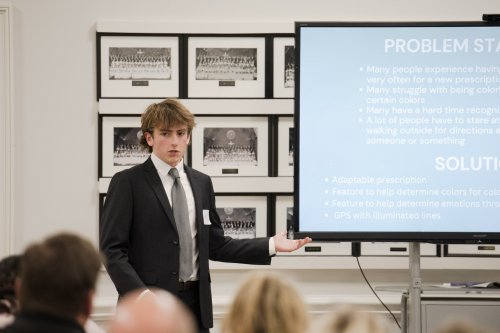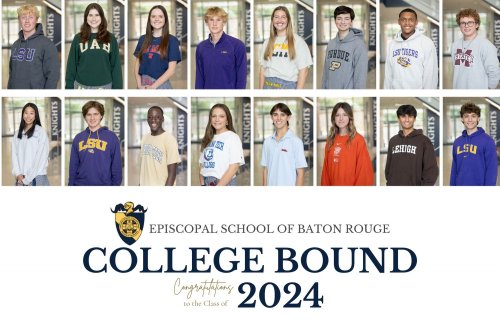- Discover Episcopal
- Admission
- Our Program
- Athletics
- Arts
- Spirituality
- Student Life
- Support Episcopal
- Alumni
- Parent Support
- Knightly News
- Contact Us
- Calendar
- School Store
- Lunch Menu
- Summer Camps
« Back
Learning Anatomy One Beat at a Time
November 5th, 2020

Did you know that you can learn about the human body in music class? At Episcopal, you can. Second graders recently teamed up with music teacher Tricia Delony to create the sounds of the digestive system. The result is what Delony describes as “good, clean, gross sounding fun.”
Before the students ever recorded a note, they learned more about Foley artists who use everyday objects and things they find to make sounds. Zippers, pinwheels, tape, bags, maracas and even a rubber duck were used as “instruments” to create audio for the mouth, stomach and intestines. As students explored the sounds generated by the objects, there were discussions on non-music related topics. Similar to a science teacher, Delony reminded students of the rule of inertia and how “instruments can’t make sounds by themselves.”
In no time, the music room was filled with the sounds of students squeezing discarded cough drop bags and knocking on wooden blocks. Delony displayed a photo overhead of an internal view of the intestines to provide inspiration, and the students created what Delony called the “pokey sounds of the intestines.” After the initial squeezing, shaking and exploring, students recorded their favorite sound for a compilation track. The recordings, when combined with the recordings of the other second grade classes, created the soundtrack of the human digestive system according to Episcopal second graders.


Episcopal Lower School students participate in music class once a week. The young students are immersed in the Kodaly and Orff method, using solfege and a wide selection of instruments and recorders. As students progress through Middle and Upper School, they build upon what they learned in Lower School and participate in band, choir and musical theater. Delony provides students the foundations of music to prepare them for the learning ahead. Choir director Carrie Poynot appreciates that the curriculum grows with the students as they advance. “It is also wonderful to get to know the students year after year,” she says. “I get the opportunity to watch them grow in their musical independence. I am lucky to take part in shaping their experience as they participate in our choral and musical theater productions.”
The National Association for Music Education points out numerous benefits for students who receive music instruction. On the association’s website, the organization lists positive behavior influences as well as improvements in a child’s spatial intelligence, ability for self-knowledge and expression, and an overall boost in processing language and reasoning abilities. NAfME representatives also share that “students with coursework/experience in music performance and music appreciation scored higher on the SAT.”
For now, the second graders simply enjoyed discovering imaginative ways to make new sounds inspired by a lesson in human anatomy. As they shrieked “ewww” and “gross,” it was clear that the lesson is sure to be a chart topper!
Second graders will show off everything they’ve learned about the digestive system with an interactive walk-through exhibit next week in the QUEST Center in Foster Hall.
The Episcopal School of Baton Rouge 2024-2025 application is now available! For more information on the application process, to schedule a tour, or learn more about the private school, contact us at [email protected] or 225-755-2685.
Posted in the categories All, Lower School.
Other articles to consider
 May16Episcopal Welcomes Father Patrick Edwards as New Head Chaplain
May16Episcopal Welcomes Father Patrick Edwards as New Head ChaplainLearn more about new Episcopal Head Chaplain Father Patrick Edwards.
See Details May16Lower School Happenings - May 2024
May16Lower School Happenings - May 2024There's excitement and joy in Lower School as students wrap up the school year. Check out the latest projects.
See Details May16Future Business Leaders Benefit from Spring Lessons/Community Support
May16Future Business Leaders Benefit from Spring Lessons/Community SupportEpiscopal students participated in two real-world learning experiences – the What’s Your Bright Idea? Episcopal Pitch Contest and the annual Burkenroad Reports Investment Conference.
See Details May8College Announcements 5.10.24
May8College Announcements 5.10.24Please join us in congratulating members of the Class of 2024 as they announce their college enrollment decisions.
See Details
Categories
- All
- Admission
- Athletics
- College Bound 2019
- College Bound 2020
- College Bound 2021
- College Bound 2022
- College Bound 2023
- College Bound 2024
- Counselors Corner
- Episcopal Alumni
- Giving
- Head Of School
- Lower School
- Middle School
- Spirituality And Service
- Student Work
- The Teachers' Lounge
- Upper School
- Visual And Performing Arts
Recent Articles
- 05/16/24Episcopal Welcomes Father Patrick Edwards as New Head Chaplain
- 05/16/24Lower School Happenings - May 2024
- 05/16/24Future Business Leaders Benefit from Spring Lessons/Community Support
- 05/8/24College Announcements 5.10.24
- 05/7/24Episcopal's Addisyn Botos Will Continue Track & Field at Southern Miss
- 05/7/24Spring Sports Success!
- 05/3/24Episcopal Audiences Wowed by "The Children of Willesden Lane"
- 05/3/24Service Learning & Community Impact Students Share Thoughts on Earth Day
- 05/2/242024 Mums of Alums Luncheon Draws Large Crowd of Supportive Mums
- 05/2/24College Announcements 5.3.24











